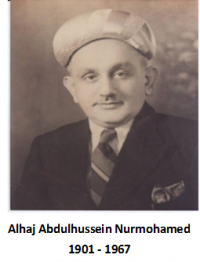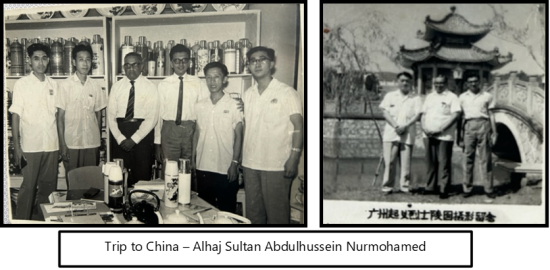Abdulhussein Nurmohamed Kalyan
Contents
Birth & Death
Birth Date: In The Year 1901
Death Date: August 1, 1967
Brief Profile
Nurmohamed Kalyan travelled to the Island of Zanzibar from India in 1880 at the age of 10. He had two brothers Esmail Kalyan and Sachedina Kalyan. The Kalyan family is one of the first families to settle in East Africa. After 10 years in Zanzibar, the family moved to Kenya. Murrabbi Abdulhussein was born in Zanzibar in 1901. He obtained his primary school education in Zanzibar and moved to Mombasa in 1913. After two years in Mombasa, he established the famous A H Nurmohamed & Co Ltd. which later had several branches in East Africa.
Leadership Skills
His first steps towards leadership started in 1922. In 1926 he entered public community service. He worked as an executive member in Indian National Congress and Indian Association for a period of 13 years before taking up the position of Hon Secretary in both institutions for two years. He then became the President of Indian Association, a post which he held upto 1948 serving the Indian community in Mombasa. He was a member of Mombasa Municipal Board from 1939 to 1955. He was Vice-President of the Board in 1950 - 1951. He was a member of the Kenya Board of Commerce & Industry for Copra and Coconut Oil production from 1945 to 1948. He was the President of the highest organ of the business community of East Africa called the Federation of Chambers of Commerce of Eastern Africa from 1948 to 1950.
After serving in the Municipal Council for 16 years, he retired due to ill-health. Murrabbi Abdulhussein was President of Pandya Memorial Society. He also served as executive committee member of Coast Subsidiary Hotel, Kenya Maize Marketing Board, East African Tourist Travel Association, and Board of Governors of Mombasa Muslim Institute. In 1958, he was appointed as member of the Kenya Legislative Council and in 1960, he was appointed in the Kenya Council of State. He also served on the Education Board of Mombasa Jamaat.
Community Service
Murrabbi Abdulhussein had enormous record of service to the community. He was President of the Federation of Khoja Shia Ithna-Asheri Jamaats of Africa from 1946 to 1949 and from 1952 to 1958. His efforts to unite the community and bring about progress in the community are well known. Owing to his noble and great service, he was awarded an honorary membership of the Council. Some of the first steps taken during his first term were to carry out the census of the community, introduce Birth and Marriage Certificates issued by the Council, award education grants and scholarships for higher education, obtain scholars for Tabligh and grants for acquisition of higher religious education.
Trip to China
As the wisdom of this esteemed personality echoes through the corridors of time, connecting continents and weaving threads of experience into the fabric of history, Sultan, the son of Murabbi Abdulhussein, recounts a remarkable chapter in his life—a journey to China. Murabbi Abdulhussein approached a senior Khoja Ismaili businessman in Mombasa, Hassanali Mussa Jetha, a man with two sons named Fatheali and Sadru with a request to take Sultan along to the Trade Fair in Canton, China, with the belief that this expedition would furnish him with invaluable experiences for the future.
Their journey took them to China during the era when Chairman Mao led the Communist Party, and Zhou Enlai served as the Prime Minister. After concluding their participation in the trade fair, they traveled to Beijing, previously known as Peking, on October 20, 1964 to celebrate Kenyatta Day at the Kenyan embassy. Henry Mulie, an Oxford graduate, served as the ambassador at that time. The embassy staff, being Muslims, suggested visiting a nearby mosque. During the visit, another notable aspect revealed the enduring existence of Islam in China. Even at that time, many hotels in China offered meals tailored for Muslims.
Reflecting on his visit to China, Murabbi Abdulhussein’s son Sultan drew parallels with the formation of the Alibhai Panju Jaffery School in Mombasa. This school, established during colonial times, received grants from the British government, with the exception of the assembly hall construction, which was deemed to be non-educational. The assembly hall featured a sign above its stage bearing a saying from the Holy Prophet (s.a.w.w), stating, "It is obligatory on all Muslims, male and female, to seek knowledge." This sign highlighted the importance of education in the Muslim community, a value that had driven Muslims to seek knowledge even in far-flung places like China centuries ago.
Death
Murrabbi Abdulhussein passed away at Karachi on 1st August 1967 at the age of 66. He is buried at Habib Cemetery. His wife Kulsumbai is daughter of Abdulla Hameer. They had 4 sons and 7 daughters. They are Sultan Nurmohamed, Mohamedjaffer, Mohamedraza, Mohamedtaki, Marziya Moledina, Roshan Moledina, Shirin Mushtaq Bandali, Nargis Mohamedali Hansraj, Mariam Anver Rahim, Sakina Anver Datoo and Sherbanu Mohamedali Gulamhussein.
- Let us remember and pray for the maghferat of Marhum Murrabbi Abdulhussein Nurmohamed, all the dedicated past leaders of our Community and all Marhumeen with Sura Fateha.
Source: AFED Trade Directory - 1960 and updates by Br. Mustafa Pirmohamed of Orlando, USA (who is originally of Lindi).
SECRETARIAT
ARCHIVES SECTION OF THE AFRICA FEDERATION
21st July 2017 (26th Shawwal, 1438 A.H.)
17th November 2023 (3rd Jamadi ul Awwal 1445 A.H.)

